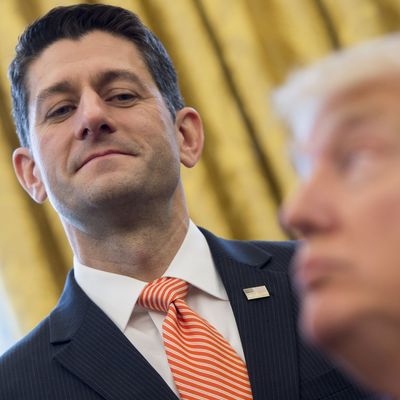
One of the flaws in the design of the federal government is that, while the founders envisioned competing branches of government, unified party control of government can turn those branches into partners who do not check each other’s abuses. A second flaw is that Congress has a diffuse and often-confusing decision-making process that can make public accountability extremely difficult. Both problems come together in a new story that ought to be huge news but will instead be relegated to legislative arcana.
Here is the story. The House of Representatives has refused to investigate either one of the two massive ongoing legal and ethical violations involving the Trump administration: President Trump’s opaque ties (financial and otherwise) to Russia, and his ongoing self-enrichment in office and violations of the Constitution’s Emoluments Clause.
If the House won’t investigate, what happens next? Well, the next-best course of action would be some form of public debate on the matter. This is not nearly as good as a real investigation, since the absence of subpoena power means Republicans can simply deny Trump has done anything wrong while blocking any efforts to acquire the evidence that would prove the case. But at least it’s something. That’s why House Democrats introduced a “resolution of inquiry” that would force House action on these issues.
Today, Politico reports the House’s response: It will divert the resolution to the House Judiciary Committee, which will (almost certainly) vote on Tuesday along party lines to kill the inquiry. It will be a minor story that probably receives scant or nonexistent coverage from television news, and then it will be quickly over. To be sure, coverage of Trump’s scandals will surely continue. But coverage of the House role in permitting Trump’s behavior will be extremely minimal.
The problem — which is a long-standing one and has protected both parties over the decades — is that the chain of responsibility is too long and obscure to have any bearing on the average voter. The average House Republican votes for the party leadership, which then allocates decisions like this to individual committees, which can be stacked with partisan loyalists from safe districts. (Of course, the overwhelming majority of House members come from safe districts that insulate them from accountability — another longstanding flaw in the system.)
If you are a voter in the district of one of the House Republicans who might be vulnerable in a potential Democratic wave election, who do you blame? Well, in January, your representative voted for the leadership that decided to shunt the resolution of inquiry to the Judiciary Committee, that will vote … but you can already see the problem. Your district’s representative had no direct involvement in the decision. There won’t be any dramatic coverage of his floor vote, as would be the case for a major law. At best, an effective pressure campaign at home might persuade your representative to endorse an investigation, but that endorsement would be toothless anyway, since Paul Ryan is calling the shots.
None of this is to say accountability mechanisms do not exist. The mechanism would be for the public to connect the majority party to the perceived failings of the president and vote to throw them out as a whole in the next elections. It is, however, a very blunt mechanism. It requires a lot of generally partisan Republicans to vote against more familiar and long-standing beliefs about guns, abortion, race, and so on to punish their elected representatives for a procedural matter. And that is why Trump has decided he can continue to demolish norms and laws, and why his fellow Republicans have decided they can safely go along.






























